Welcome to Classics at Royal Holloway! With this live blog we open a window into what keeps us excited and what makes us a special community we are all proud to be part of. Contributions are offered by us all, students, staff, former students and friends, as and when we have something to share about module highlights, research ambitions, dissertations, excavations, Classical Society evenings or trips, creative projects, summer adventures, graduate careers and more.
Spring 2026
Treachery, trickery and tears: the Odyssey without Odysseus
Mollie Legg, part-time teacher and part-time 1st year PhD student
Over the last few months, as part of my practice-informed PhD programme, I’ve been visiting different schools – five in total – delivering and organising workshops for Key Stage 3 students about how the royal household of Ithaca dealt with Odysseus’ absence and sudden return! Some of these workshops have also been delivered by the wonderful Tom Barrett and Jojo Hills, my fellow PhD students in Classics at Royal Holloway.
The first workshop used debate to highlight the differing motivations of the suitors. To kick off this workshop, we read an extract from Claire North’s Ithaca, which describes the suitors Antinous and Eurymachus in the acerbic voice of Hera. We then looked at the suitors Amphinomous, a more reasonable non-Ithacan suitor, and Leodes, a wannabe priest! I divided students into groups. Each group then advocated for a different ‘plot’ to resolve the Ithacan stalemate: our Antinous-students championed a violent coup in the palace; our Eurymachuses supported an assassination of Telemachus and seduction of Penelope; the students representing Amphinomous recommended making their proposals and leaving; and supporters of Leodes suggested making a sacrifice and asking the gods for guidance. Overall, students were mostly opposed to the plots of Leodes and Eurymachus. With Leodes’ plot, students objected to the cruelty of animal sacrifice and with Eurymachus’ plot, they rejected the ‘shady’ nature of his plan. Perhaps surprisingly, students were often more comfortable with the upfront violence of Antinous – at least with him, you know what you are getting!
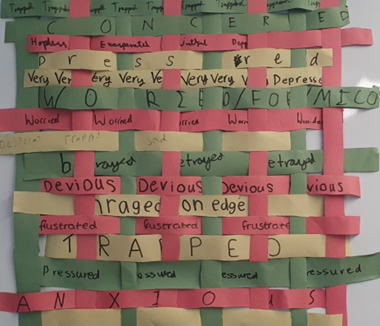
Tapestry exploring the emotions of Penelope
The second workshop looked more closely at Penelope’s deception of the suitors. The session incorporated creative writing to consider the views of the suitors, maids and Penelope on her trickery. Generally, students seemed most interested in the boredom and frustration of the maids, the feeling of entrapment of Penelope and the rage and petulance of the suitors! Students also contributed to paper tapestry-making to examine Penelope’s feelings, putting emotions on strips of paper and weaving them into a larger frame. Here, weaving was used to explore Penelope’s emotions rather than her capacity for deception.
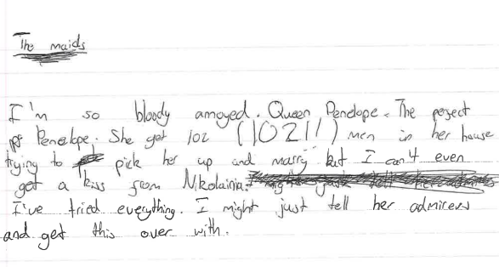
The maids perspective of Penelope’s weaving
The third drew on modern adaptations of Telemachus’ narrative to reinterpret his reunion with Odysseus. We read more extracts from Claire North’s Ithaca trilogy, first exploring a crisis of masculinity in Telemachus, who was raised exclusively by women, and then exploring the awkward dynamics of Odysseus’ return. This provoked questions about what pressures young men face growing up, how long it takes to get to know someone, and whether Telemachus should treat his long-absent father with any reverence. Finally, we used script-writing (and in some cases, dramatic performances!) to explore the initial reunion of Odysseus and Telemachus.
The final workshop applied principles of restorative justice to design consequences for the suitors that served the broader community. While violent punishments were off the cards, many of the punishments were still very creative. For example, some suitors – most notably Antinous – were often sentenced to a lifetime of work in the sewers!
In each workshop, students’ final task was to design a fabric square envisioning what home meant to the suitors, Penelope, Telemachus and themselves. Eventually, I will take on the role of Penelope and 'weave' these squares together to create a piece of art that will be displayed at Royal Holloway in some capacity - watch this space...!
Overall, it has been really rewarding to run these workshops. The students have made me reflect on how parents – and adults more generally – need to earn authority in the lives of children. They also made me question whether we find violence more manageable if brazen, rather than underhand. Finally, spending time doing these workshops, made me think about what activities can best draw out these conversations.
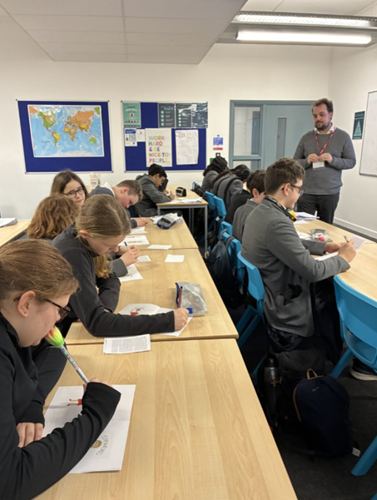
Tom working with students at River Academy
On a conference in Copenhagen, and changes of scenery
Dr Josh Thomas
Back at the start of December, I was in beautiful Copenhagen delivering an invited talk at a conference on Local portrait habits in West Asia and Egypt (100 BCE – 500 CE). The conference was organised as part of the Locally Crafted Empires project being run by Prof. Rubina Raja and her collaborators at Aarhus University, which aims to investigate local portrait cultures in Western Asia between the Late Republican period and Late Antiquity.
I have been fortunate enough to speak in some impressive settings during my career so far, but the venue for this particular gathering — the Royal Academy of Sciences and Letters in Copenhagen — probably wins the prize for the most photogenic of them all. Its grand painted canvases, imposing marble busts, and elegant interior furnishings will certainly live long in the memory.
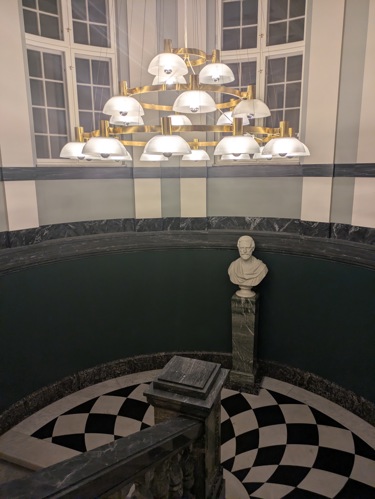
Over the two days of the conference we were spoiled with a fantastic set of papers tackling a fascinating range of topics: from funerary portraiture in Roman Cilicia to anthropomorphic statuary in ancient Arabia; from plaster heads in Roman Egypt to the famous corpus of Palmyrene funerary reliefs; and from new material discovered at Berenike Troglodytica to mosaic portraits from Edessa. What better way to get into the festive spirit?!
My own talk was about a fascinating statuary display discovered in the Hadrianic Baths at Aphrodisias — an ancient Greek city in modern south-west Türkiye, where I have been working since 2015. This statuary display involved a striking juxtaposition: on the one hand, a grand portrait statue of a late antique benefactor wearing a contemporary ‘power costume’ reserved for Roman governors; on the other, three mythological groups depicting figures and stories from the heroic past, including Achilles killing the Amazon queen Penthesileia. My core argument was that this juxtaposition would have been full of meaning and resonance for contemporary viewers in Late Antiquity. Those who saw the display were surely invited to compare the virtues and achievements of the benefactor honoured with the portrait statue to those of the great heroes of the mythological past.
One of the display’s most interesting features is that most (perhaps all) the statues seem to have been ‘recycled’ from elsewhere in Aphrodisias. That is, they had been taken from other contexts in the city before being restaged as part of a new display in one of the city’s main bath buildings. In this case, then, a change of scenery helped to invest the statues with new purpose and meaning.
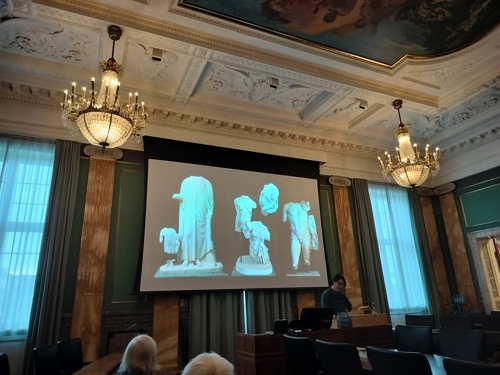
On a personal note, changing scenery has become a central part of my life as an archaeologist. On the larger scale this has involved moving between jobs in different countries, working on fieldwork projects in different places, and attending conferences like the one in Denmark. But this is also something very important to my day-to-day existence as well. I will never fail to be amazed by how much even a small change of place or pace can help to add new impetus to my work and my research. This might involve going for a walk or run to think through a new idea, switching to a totally different desk in the library, or reading something new and exciting just because I want to.
We all have our own ways of staying on top of work and study – and certainly there is no ‘right’ or ‘wrong’ method! But if your existing routine starts to feel stagnant this term, why not try working somewhere different or new? It might just light a spark.
Autumn 2025
Proud of being an ‘inclusive community’
Dr Richard Hawley
You’ll have heard that our Classics Department is proud of being an ‘inclusive community’. But what do we mean by that?
Alongside being a tutor in ancient Greek language, literature, gender and identity, ever since I joined the Department in 1991 – yes it sounds like ancient history! - I’ve actively promoted opening up the study of ancient Greek and Roman culture to everyone, and have introduced new, more inclusive perspectives on those cultures into our teaching.
Way back in 1991, the world was very different, especially in its attitudes towards gender and sexuality. It was a time before the equality legislation that we know in the UK today and when the study of gender by classicists was just really starting to take off, especially in North America.
When I arrived in the Department I proposed to my then (male) Head of Department that I design a module to focus primarily on women’s experiences in ancient Greek and Roman society. I remember him asking me whether I really thought there would be any demand for such a subject. How wrong he was! In its first run I had 40 students (a lot in those days), of whom 39 would have self-identified as female and just one as male. My students relished the chance to look at classical literature and history from this new perspective. I remember vividly how the one male student told me at his Graduation how he had found the experience of being the only male student in that class life-changing. One of my module’s aims had really struck home for him!
Over the years that module has evolved to reflect evolving social attitudes towards gender and sexuality. Now my module focuses on Gender and Performance in ancient Greek culture. We study classical dramas, satire, intersectionality with race and social class, and ancient philosophical and medical concepts of gender, all within an often-eccentric selection of ancient Greek legal contexts.
In recent years I am so pleased to see my students taking the module to explore their own identities through the lens of classical culture, looking at concepts such as gender fluidity. They sometimes develop this in their final-year dissertation.
But our ‘inclusive community’ is much more than just what we study in classes. It is our diverse students and staff. Who do you think our students are? Only those who are already academic experts in classics? No way.
Half our incoming students come without having studied classical culture before formally but bring their skills and experience from other disciplines and their passion for Classics. About a third of our students have neurodivergent or special learning needs for which we offer expert tailored support so everyone can achieve their potential. Following an educational grant from our Faculty, a small group of students and colleagues put together a special resource, the MINOTAUR (Mental Illness and NeurOdiversiTy Academic sUppoRt) handbook, which provides a range of strategies and advice for common challenges that students face during their academic journey, now available as a support tool to anyone in our community who may find some of the strategies useful. Our Department was among the first to welcome and support trans and non-binary students. Our classes thrive on discussions that include students’ different cultural perspectives.
So what about you?
Whether you are sure of your identity, or are just finding it, whatever your background or previous study, we’ll welcome you to our family of past, present and future students. We’re here to help you grow in confidence and prepare for success in an ever-changing world. Whoever you are, if you share our passion for the past, you’ll fit in. And that’s what we mean by an ‘inclusive community’.
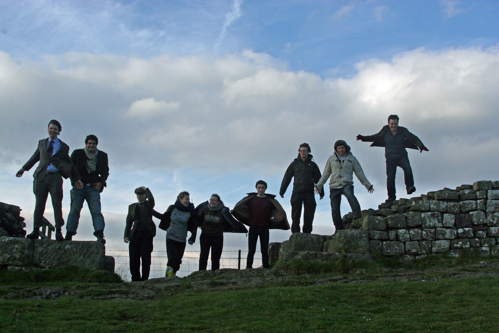
My Thessalian Odyssey
El Griffin, MA Ancient History student
“Last July I had the fantastic opportunity to travel to Thessaly in northern Greece as part of a joint trip with the University of Oxford in order to gain some practical experience with museum archaeology. We were able to work in the museum at Volos as well as go on several field trips to sites such as Demetrias, and museums at Larissa, Karditsa, and Vergina.
The area around Volos has been inhabited since the neolithic times several thousand years ago with the Hellenistic city of Demetrias being founded nearby in 294 BCE. Due to this continuous habitation the museum in Volos, as well as the other museums we visited within Thessaly, contain material from a wide variety of historical periods including prehistory. When visiting the museums we saw a wide variety of fascinating artefacts from lots of different contexts. A personal favourite was a fragment of statue that had been reworked into the capital of a Byzantine column at the museum in Larissa. But there were a great number of equally captivating objects ranging from the giant horn of an extinct Auroch (wild cattle) to an inscription from a statue base dedicated to a Roman emperor. We also had the chance to closely inspect the famous painted funerary monuments found in Demetrias now in Volos and practise the interpretation of ancient art.
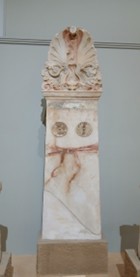
Painted Hellenistic grave stele from Demetrias, Volos Archaeological Museum.
In addition to these trips we had plenty of opportunities to handle archaeological material within a museum context, focusing primarily on the cataloguing of finds from the Hellenistic sanctuary of Pasikrata in Demetrias. Many of these were small terracotta votive statuettes found at the site in the early 20th century. The majority of these statuettes were ‘kausia boys’, small statuettes depicting young boys wearing a hunting cloak (chlamys) and a distinctive type of Macedonian hat called a kausia. There were also several statuettes of figures in female dress and some slightly more unusual fragments such as the head of a satyr (possibly Silenus). I particularly enjoyed working with these statuettes and during this I was able to identify and reunite several of the larger fragments which was extremely satisfying and will hopefully make future research on these brilliant artefacts a little easier.
The trip also allowed us to view several large archaeological features in person which was a highlight of the whole experience as seeing these in person inspired a feeling of awe that is difficult to quantify. In particular, the entire group was very taken by a Mycenaean tholos tomb at Georgiko in Thessaly and the royal Macedonian tombs in Vergina, which both inspired a sense of awe. Alongside these we also visited a temple of Apollo also near Metropolis and another brilliant tholos tomb dating to the Archaic period near Pharsala.
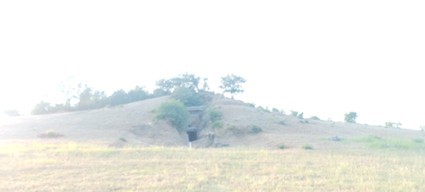
Mycenaean tholos tomb, Georgiko.
Whilst there I was lucky enough to be able to complete several sketches of the artefacts held in various museums, including this sketch of a statue of Artemis from the theatre at Larissa which is dated to the 1st century CE.
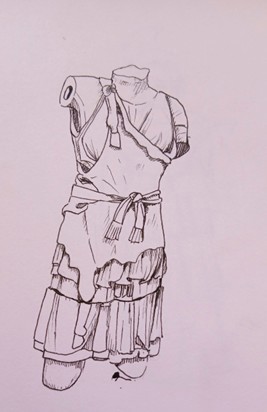
Sketch of a statue of Artemis from the theatre at Larissa, 1st century CE.
This trip was an amazing experience because I got to visit a series of wonderful locations in such a short span of time, as well as getting to work with the collection of the Volos Museum which was very rewarding. I have been given a deep-seated appreciation for the archaeology of Thessaly and Macedonia, and the chance to go on this trip has already been directly beneficial to my academics.
I would like to extend my thanks to the Ministry of Culture of the Republic of Cyprus for the generous grant funding that allowed me to participate in this trip, the Hellenic Institute at Royal Holloway for their practical support, and finally to Professor Maria Stamatopoulou and the staff of the Athanasakio Archaeological Museum of Volos for all their help and knowledge which made this experience so rewarding and enjoyable.”
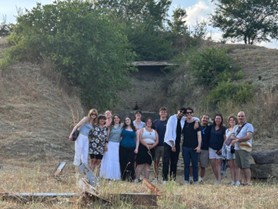
Students and staff on the trip to the Mycenaean tholos tomb.
Terror, Magic and Persecution in the late Roman Empire: a finalist dissertation in the making
Isobel Carnochan, 3rd year Classical Studies and Philosophy
“Starting the final year of my degree is undeniably scary, for countless reasons. The prospect of the adult world of jobs, mortgages, and student loan repayments waiting at the other end does put a slight damper on third year. But, final year also comes with its own unique rewards: that is, getting to choose my own research focus for the very first time.
For a long time, I’ve been fascinated by the academic study of magic and the supernatural. Historians have tended to consider magic from a magical realist perspective, presupposing that magic is its own category of action, a thing that one can genuinely attempt (even if these attempts result in failure). But, what constitutes ‘magic’ varies across time and space; really, magic is a discursive issue, a label weaponised against (often religious) certain practices that often deviate from social norms. Witches are a good example of this. On the individual level, people have historically feared the idea of witches for their ability to do harm unto them. Yet, many modern scholars also suggest that ‘the witch’ as a folkloric character can reflect cultural fears of the ‘uncontrolled’ woman – which, in turn, reflects the contemporaneous ideology surrounding women and their societal role. Folklore then becomes a means through which ordinary people express, cultivate, and share both their fears and ideologies, as influenced by their social and political environments.
But following up the link between magic and ideologies of fear lands us right in the midst of my other long term interest: the much larger and far less niche study of politics – and specifically, the areas where politics at the large social level meet the individual on a personal level. I’m sure this will be unsurprising to those who know me; as the publicity officer for Amnesty International society this year, I’m always talking about some political crisis or other. Juggling society roles with my academic workload can be incredibly challenging at times, but in some ways I find that maintaining the balancing act grants me a greater appreciation for the unique rewards of both. Yet, one of the key things that I’ve learnt during my time with Amnesty is that religion is, and has been, arguably one of the most complex interactions of the personal with the political: and my dissertation has allowed me to explore this in much greater detail.
Religion constitutes the ideals a person revolves all their actions around, the subjects they think about in their most personal moments, like before bed or before eating, and the way they interact with the entire external world; in this way, it is deeply personal. Yet, religion is both utilised and persecuted by the state on a much broader level. It can be used to enforce a certain ideology, or to enforce a certain set of behaviours. A person’s entire eternal existence is a much higher stake than their limited earthly one, making religion an excellent tool of the state to enforce conformity. It is both deeply personal and deeply political.
With all this in mind, I’m focusing my dissertation on the persecution of ‘magic’ (i.e. unsanctioned religion) in the fourth century Roman empire, with a particular emphasis on explaining it via the sociopolitical and economic occurrences at the time. I’m excited to discover what practices – whether this view was shared by society at large, or specifically by the ruling elites – were encapsulated by ancient roman ideas of ‘magic’, and what it was specifically about the AD 300s that warranted so much legislature against it. At this point in time, I suspect that the mass amount of legislature against magic, and the persecutions of supposed practitioners of such, will stem from elite fears of societal revolution, but at this stage I obviously cannot say for certain. The brilliant thing about a dissertation is that I have the time to find out!”
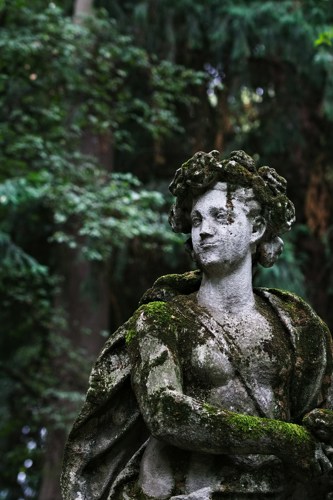
Statue of a woman, covered in moss and evoking dark mood, set amidst a backdrop of trees in Gorgonzola, Italy. Photo by Christian Cagni.
“Dispatches” from Yale University
Emily Howe, 4th year PhD student
Back in late August, our PhD student, Emily Howe, embarked on an adventure at Yale University, New Haven, Connecticut as a Research Exchange student based in the Classics Department. She very happily sent us her first “dispatch”, that suggests she is having a very productive time at Yale and enjoying life in New Haven: autumn in New England is magical! She promised us a second, final “dispatch” just before Christmas, as her time at Yale will be drawing to a close. Thank you, Emily!
“As I enter the final year of my PhD with the Classics Department at Royal Holloway, I'm spending the 'fall' semester at Yale University, working on Roman Egypt and Judaea with Professor Joseph Manning. The scholarly community here has been really wonderful and welcoming - I’ve met with lots of the faculty across the Classics, History, Divinity School, and Jewish Studies Departments, who have been so helpful with my research!
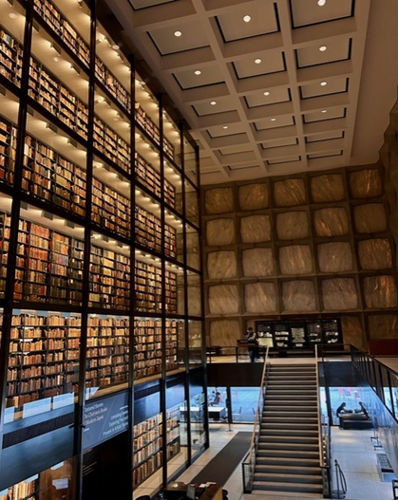
The stunning Beinecke Rare Book and Manuscript Library, where the author of Classics News studied Papyrology many moons ago
I’ve been spending lots of time in the libraries here at Yale, including Sterling Memorial and most notably, the Classics Library with its collection of over 25,000 volumes. I've also been fortunate to access the extraordinary resources at the Beinecke Rare Book & Manuscript Library (follow the link to find out about the History and Architecture of this library), which houses approximately 3,400 papyrus manuscripts from Oxyrhynchus (the ancient city west of the Nile), as well as the Bela Lyon Pratt Coin Room, containing over 5,000 Greek and Roman coins dating from 60 BCE to 150 CE. There’s a lot to research and take part in here!
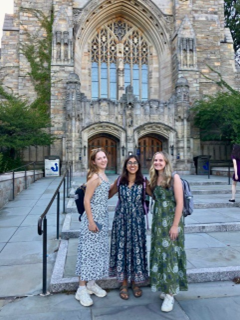
Emily (left) and friends
Beyond the archives and manuscripts, I've been embracing the full Yale graduate student experience and have met some fantastic and friendly Americans! I've joined a weekly trivia team at the Yale Graduate Student Bar, ‘Gryphons’, and we’ve even won! I've also fully taken part in the American autumn tradition of trying everything pumpkin spice and enjoying the rather elaborate Halloween festivities.”
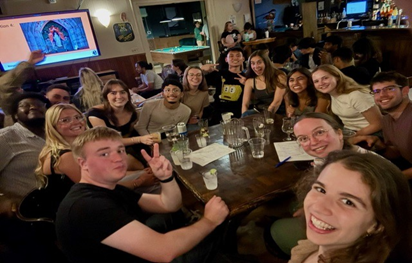
A Prize-Winning Book: Egyptian Households
Prof. Richard Alston
A few years ago, I was invited to Cornell University in Ithaca, New York to present at a conference on Egyptian houses. It was the first of three invitations in short succession to present and write about the family in Roman Egypt. Last year, the papers from the conference were published in a book edited by Caitlín Ellís Barrett and Jennifer Carrington entitled, Households in Context: Dwelling in Ptolemaic and Roman Egypt. Perhaps not destined to be a best seller, but, amazingly, it has just been announced that the book has won the James R. Wiseman award prize for the best archaeology book of the year (2026) as judged by the Archaeological Institute of America. I have never won anything before, so this is a real surprise and delight.
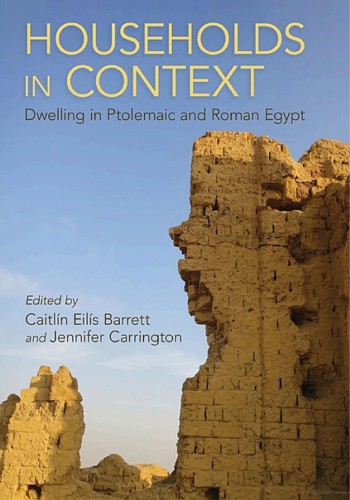
Research and writing are always collaborative. You learn and gain inspiration from others and talking to and working with others makes you think in different ways. At the conference, I learnt that many things I thought I knew were wrong; that the latest archaeological findings had changed what we know about the architecture of houses; that the houses I was studying were strangely different from houses in other places and other times in Egypt. And I got the opportunity to have really clever people talk to me about my ideas. I learnt loads.
My contribution (‘Modes of Production and Reproduction in Roman-Era Egyptian Villages’) focused on houses and households in small Egyptian villages in the first two centuries CE. It brings together a lot of the things I am interested in: how poor families managed to deal with the basic everyday requirements of survival over the long and short term; how families organised themselves; what roles did people play in those families and how were those roles divided by gender. I studied what we can tell about household economics from domestic archaeology. I looked at family archives and saw how they organised marriages and children. Key things I took away were that these village households tended to have surprising numbers of people in them, that marriages tended to be between people who were already very closely connected, and that running the household to make everything work required discipline and authority. The family was a bit like a small firm in which everyone had to pull together to make it succeed. More people meant more mouths to feed, but it also meant more people to do the work which was really important, particularly if a key family member got sick or died.
One of the best parts of this type of research is that it puts you in another world, one that is so remote from our own, but with people with recognisable concerns and drives and needs, and that we can get a sense of their precarious, complex and organised everyday lives.
At least some of this material is taught in my Social and Economic History module and sharing it with my students is great privilege and a lot of fun.
Three unforgettable weeks in the British School of Athens
Linnie Serstobojeva, BA in Classical Studies, 2022-2025
After her graduation in July, Linnie’s summer included a very special opportunity. She wrote to us about it in a post brimming with excitement and happy memories.
“This summer, for three weeks, I had the absolute privilege of attending the annual summer school at the British School at Athens. I spent my days immersed in archaeology, detailed on-site seminars, and insightful lectures by top experts in their field. It was a glimpse of what further study could offer. I was expecting a rigid experience: the itinerary was fully packed, and I had assumed there would be a level of propriety that I’d be unfamiliar with. Chiefly, I mentally prepared for an environment more suited to an older, more experienced crowd – academics I’d struggle to connect with or where I’d have to grow used to feeling out of my depth.
I was proven wrong on many accounts. The community at the BSA that I joined for a few weeks was nothing but contemporary, dynamic and welcoming. The institution I’d assumed would be hard to fit in with, due to its prestigious reputation, showed me a profound passion for learning and an active approach to teaching that was far from exclusionary.
Spending my summer at the British School at Athens allowed me access to sites and places I never thought I’d get the chance to visit, particularly in terms of special access to the inside of certain temples, and a behind-the-scenes look at ongoing excavation and conservation efforts. It felt like peeling away the heavy, and often abstract, terminology of archaeological books and papers to finally comprehend their meaning. There is nothing like viewing a site first hand, and I heavily encourage anyone interested to apply. The process can seem daunting, but ultimately it is incredibly rewarding and refreshing.
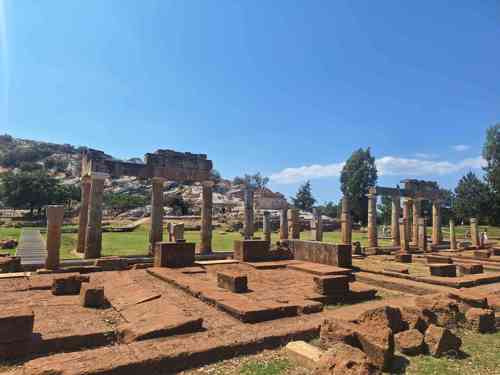
The sanctuary of goddess Artemis at Braurona in Attica.
I will happily admit that I was influenced to apply after the experience of the City of Athens trip in the third year of my undergraduate studies at Royal Holloway. Seeing sites in person influences your understanding of them a great deal and, after getting a taste of that experience, I set my heart on finding a way to get back to studying in Greece. Practical archaeological tools like floor plans, site maps and diagrams become easier and more natural to understand once you have a working vision of what they represent, and I wanted to improve on my skills before thinking about applying for a master’s. I know personally I often struggled understanding orientation in the ancient world and where different significant archaeological findings were in relation to one another. A part of my experience at the British School of Athens was venturing out with another student in our free time to the Philopappos Hill to view the slopes of the Acropolis. We spent time naturally chatting and debating about where things were in the ancient city, and why that might be. We ended up with a better understanding of orientation than either of us had really had before, and I can say it certainly makes ancient texts like Pausanias easier to read too.
Another hugely rewarding part of the course was meeting people from different universities across the UK– when you’re thrown in an unfamiliar setting with unfamiliar people it turns out you make friends really quickly, because everyone’s in the same position, and just as enthusiastic about being there. All of us came from different backgrounds, had different perspectives and interesting contributions to the discussions and it really was an environment that made it natural to keep learning even when the lectures had stopped.
As for funding this adventure – I was lucky enough to have received bursary from the Classical Association which was very straightforward to apply for. The rest of the cost I funded through saving my student loan and working a part time job in my third year, which was admittedly tough but unbelievably worth it.
To anyone thinking about further study in archaeology, look out for this opportunity and others like it, because it will be more than worth the effort it takes to get there.”
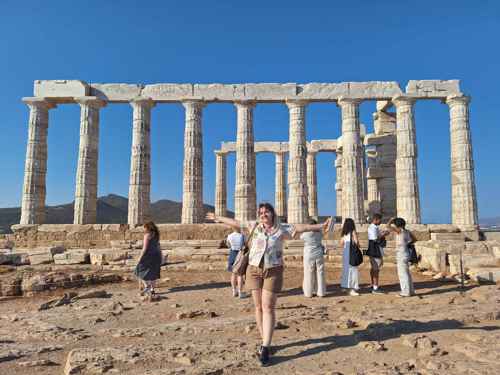
Linnie in front of the temple of god Poseidon at cape Sounion at the southern tip of Attica.
Summer 2025
Coming full circle: Connecting classical and modern rhetoric research
Julius Graack, MRes Rhetoric Student
"Before I started my Master’s by Research in Rhetoric at Royal Holloway, I was working as a parliamentary assistant in the European Parliament in Brussels. In my position, I was regularly confronted with speeches and speechmaking, for example in the debates in the plenary, during committee meetings or in the political groups. They always intrigued me, especially in such a multilingual workplace. To see laws being negotiated in 24 languages, and after a final agreement being translated again into 24 languages in which the law is applicable: never did I see how much a singular word can matter. This constant occurrence of rhetoric actually sparked my interest to pursue a postgraduate programme in the field, and that’s how I ended up at Royal Holloway.
If I am entirely honest, I was quite intimidated before the programme started. I had Latin and Ancient Greek in secondary school in Germany, but my last lessons were more than eight years ago. I also hadn’t been at university for some years now, having to readjust to an independent student lifestyle once again. And of course, I did not miss out on the hurdles of being an international student, including visa problems and housing difficulties. Nevertheless, my start in the MRes Rhetoric could not have been better thanks to the welcoming attitude I received from Prof. Lene Rubinstein as programme leader and my fellow co-students. The interdisciplinarity of the master’s not only allowed me to join the discussion with less classical knowledge but encouraged the practical perspective I could offer from working in politics. And it was exactly this interdisciplinarity that allowed me to delve into classical rhetoric and apply it to its modern realisation.
As part of the research-oriented programme, we are conducting our own two independent projects, which we finalised in the summer term. The great opportunity of these projects is the wide array topics we can choose: From classical to modern rhetoric, all topics of interest can be considered. One of my projects under the supervision of Prof. Christos Kremmydas really gave me a full circle moment: I wrote a paper on the interconnections of parliamentary speeches in the European Parliament and their dissemination on social media. Using Aristotle’s rhetorical approach of identifying audiences and Isocrates’ rules of kairos, of finding the right moment, I analysed how Members of the European Parliament use recordings of their plenary speeches on their social media accounts. Not only was I able to combine classical and modern rhetoric, but I could make use of my practical perspective in the best way possible.
The cherry on top happened at the end of June, when I had the chance to present my paper at the conference Rhetoric in Society 9: Rhetoric in the Digital Age in Zagreb, Croatia. Organised every two years by the Rhetoric Society of Europe, this is one of the academic conferences where interdisciplinarity is essential, and classicists have an important seat at the table. It was such a thrilling experience not only to participate in my first ever academic conference but to also be able to present a paper in it too! It goes to show what the academic foundation of the Classics Department can offer even in a one-year master’s programme. One year ago, I would have never imagined taking these academic steps this early. Today, I am proud to have combined my political experience and my academic knowledge, and I am most of thankful to Royal Holloway for making it possible."
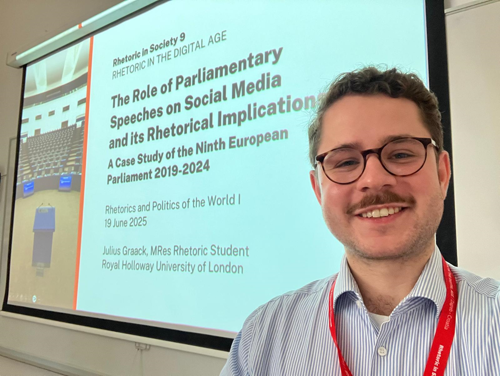
Julius presenting his paper at the Rhetoric in Society 9: Rhetoric in the Digital Age conference in Zagreb, Croatia.
And as if he was not busy enough, Julius also took over the role of Classics Dept Media Officer half way through the academic year. We are very thankful to him for stepping in and for all his support on this front!
Celebrating Classics Research: Thoughts on our Research Day
Prof. Richard Alston
Exam marking is finished. The Undergraduates have departed for the summer. The sun is out and we turn to research. Classics at Royal Holloway is a research-intensive Department in a research-intensive University. That means, among other things, that we have a community of cutting-edge researchers and we bring that research activity to everything we do.
June 12th was Research Day. Twenty-two different research presentations from staff and research students were enjoyed in a long and inspiring day. I am currently research Lead in the Department, which means that I look after our research activities. And this day was just a delight for me; an opportunity to encounter again so much of what we do and savour the fantastic range of activities and projects in which our colleagues and students are involved.
So what did we cover?
In our ‘Memory’ section, Josh talked about a statue from the main street of the ancient site of Aphrodisias in Turkey. The statue provided the clue to the rediscovery of a whole public bath house built in the fifth century CE. Harry introduced us to an arch in the Alps that demonstrated, beautifully, how Roman imperial power extended over the Alpine landscape and the peoples therein. Emilio took us to Rome to investigate militant political defacements of Roman monuments in the second century BCE.
In our ‘Classics as Public Engagement’ section, Rhiannon explored the rather mysterious pathways by which Aristotle features in the critical vocabulary in secondary schools. Mollie led us through how she uses mythic stories to get secondary-school students to devise their own community constitutions and think what is important in personal and community relations. Efi talked to us about how she develops relationships with partners to develop participatory workshops based on ancient mythical story arcs for the Myth and Voice community arts project which has now reached 850+ people (and growing).
After a brief excursus (Myth and Brain) from Nick with disturbing and peculiar mythic stories to put us off lunch, we came back to ‘Families’. Lene explored how Greeks used complex financial arrangements with temples to protect slaves from being seized by creditors. Annette explained how Italian fascists used Augustan precursors to claim that their policies on women and family were part of a national tradition. Then, Liz discussed why heroes in Senecan drama seemed to bring no end of trouble to their families and loved ones.
We then moved to a ‘Speech and Rhetoric’ section which built on the work going on in our Centre for Oratory and Rhetoric. Justin explored the rhetorical and moral teachings of John Witherspoon, one of US’s Founding Fathers. Menghzen took us through the implications of how Persians were discussed in Athenian rhetoric and how that reinforced cultural presumptions. Julius told us about his independent project on a rhetorical competition in Germany sponsored by no less than the Federal President of the country. And Reve made us think about the relationship between rhetorical teaching and Greek drama.
In our ‘Growing and Building’ section, Jari took us to Naxos in Sicily to explore the urban plan and, among other things, a well that was filled in after the city was destroyed. Erika had a project on luxury villas in Italy, which takes her to lots of lovely places, where she explores the agricultural environments through the archaeobotanical detail. And then Erica explained the archaeobotanical evidence from Turkish sites which shows that in Lycian Sardis they were eating lots of barley stews while in late antique Aphrodisias they had a varied diet of appetising Mediterranean fruits and vegetables but also caught parasitical infections.
And we finished with explorations on ‘Leadership’. Max talked about Octavian and populism, using modern political theory to think about Roman politics. I finished off the day by thinking about the Egyptian Goddess Isis and how her cult models the way Roman emperors later became gods.
This is what we do in Classics: so much and from so many different angles. Our strength is our plurality.
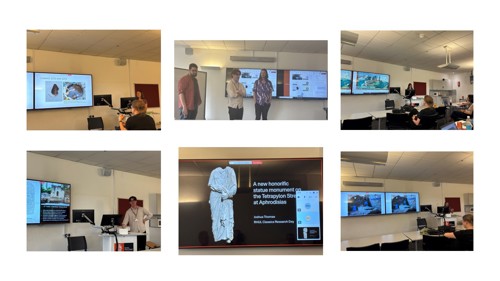
Greek Myths get scientific: A Periodic Table of Greek Mythology
Livia Adams, Masters by Research in Classical Reception, 2021-22
We were very excited to connect again earlier in the year with Livia Adams, a recent graduate of our rather unique Masters by Research in Classical Reception degree. Livia has always been super keen to explore how Classics can be relevant, fun, accessible to many of us in the 'here and now' and that led her to some innovative research on video games and classical antiquity, the topic she chose to work on for her Masters long dissertation. She had been on the look-out for opportunities to engage with Classics outreach work ever since when… But let’s read about her adventure in her own words through the blog post she just sent us!
‘In September 2023, I received a very exciting email inviting me to be a part of an amazing, secret project: a book that would be titled A Periodic Table of Greek Mythology, which would contain over a hundred figures from Greek mythology and information about their stories and legacy, with the idea that each page would belong to a different character, and each page would be written by a different contributor.
The project was organised by Working Classicists, an organisation founded by Miri Teixeira and George Connor, who work to make the study of Classics more accessible to those who are working class or state school-educated. For too long, Classics has been widely perceived as a subject reserved for the wealthy, Eton-educated elite, such as former Prime Minister Boris Johnson. This is partly because Classics is not widely offered in state schools, but since 2021 Miri and George at Working Classicists have been working to change this by speaking at schools and conferences, and providing resources and solidarity for anyone in the state sector. Working Classicists stands for championing the voices of the disadvantaged and less privileged, and this is the very heart of A Periodic Table of Greek Mythology.
By October 2023, Working Classicists had brought together 117 different contributors from different classes, ethnicities, genders and experience levels with Classics. As stated in the book’s foreword, just under 80% of the contributors come from a working class background, and 81% of us attended a state school. And in terms of diversity, the statistics also showed that 48.7% of contributors identified as female, while 29.1% identified as male, and 15.4% as non-binary. 58 of the 117 contributors (myself included) identified as LGBTQIA+, 43 identified as neurodiverse, and 12 identified as BAME or POC. As for experience level, the statistics show that 42.6% of contributors have been educated to a Postgraduate level, 24.8% to Undergraduate level, 17.9% to Doctorate level, and 6% to High School level. This book is a microcosm of what the Classics community really is: diverse, and made all the better for contributions from the less privileged and disadvantaged.
Once contributors had been found, it was then a matter of deciding who was going to write about which mythological figure, and how the Periodic Table elements would come in. We were given a spreadsheet of different heroes, Olympians, Titans, villains and so forth, from which we were each asked to choose someone to write about. As someone with a longstanding fascination with him, I chose to write about Ares, the god of war. We were asked to write about 300 words on our chosen figure, including their history and backstory, what they’re known for, and what their legacies in the modern world are. Then, we sent our pages off for editing. As is the way of academic publishing, the editing and production of the book took quite a while, but on December 31st 2024, the publishing date was announced, and finally, the book was officially announced publicly in January 2025 and then released by Contubernales Books in February.
In the months following the book’s launch, Working Classicists held in-person and online book launch celebrations, and the book has so far had some great success. The proceeds from sales of the book go back to Working Classicists, so that they can expand their outreach, and access to the study of Classics, across the UK and perhaps even beyond. It was a real honour and a privilege to be a part of this project; as someone who has not made any academic contributions to the field, I have at times worried that I am not a ‘proper’ Classicist, whatever that means. But being part of this project taught me that there is no ‘wrong’ way to be a Classicist, or to engage with Classics. To be part of such an amazing project with such an important message was one of the best things I have done, and it still gives me a thrill to see my name in print!
I would like to give my heartfelt thanks to Miri and George at Working Classicists for inviting me to be a part of this wonderful project. To keep up-to-date with what they are up to, you can find them on Bluesky at @workingclassicists.bsky.social, or @workingclassicists on Instagram. You can find their website. Finally, if you would like to pick up a copy of this book for yourself, you can buy the book online at Amazon or Waterstones, but in order for Working Classicists to receive a greater cut of the proceeds, I would recommend buying directly through the publisher, Contubernales Books.’
One degree, two pathways: combining English and Classical Studies at University
Zara Harris, 3rd year English and Classical Studies
‘Studying both ancient Classics and English Literature has been such an amazing experience. They help me think more critically and openly, to look at things from different angles. A lot of what I’ve learned in English Literature, especially when it comes to analysing texts, has been really useful when studying Greek and Roman literature. In English, I’m constantly exploring themes, characters, and symbols in novels and poems. This gives me the skills and confidence to notice so much more in my ancient texts like, for example, in Ovid’s Metamorphoses, the primary material of my final year dissertation in which I have explored ecological poetics and perspectives and which, in turn, has much refreshed the way I approach texts from my English Literature modules.
Another exciting element of doing a joint honours degree is the diversity of the module choices. You get the option of studying everything from ancient languages and archaeology to children’s literature and Early Modern literature. This is the opportunity to find a niche among many subjects, or, reversely, work with a variety of topics to develop a wider picture of the ancient and modern world.
Personally, I am drawn to ancient poetry and mythology, which has influenced and inspired a lot of my English essays. And this is not an original experience; a lot of people I’ve talked to who study Classics and English also find themselves leaning on this understanding of the ancient world when writing English essays. It’s something that just happens when you’re immersed in the classics; they leave an imprint on how you view all literature.
My dual-route study and interests also allow me to enjoy really exciting debates in the Literature Society, of which I am a member, and which attracts students from a huge variety of backgrounds, inside and outside Humanities. I love feeling at ease in these kinds of diverse environments and it was the joint degree with Classics that equipped me with the outlook for this. I am really pleased I chose this path and I am ensuring I make the most of it all the way to the last coursework submission of this - my third and last - year!’
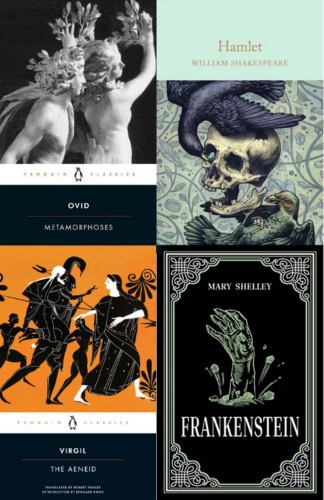
Two papers in two days in Italy
Dr Emilio Zucchetti
‘I was in Italy in the very end of the Spring term to give two invited talks. On Friday, 28th March, I was in Bologna for a training event organised by the Centro Studi per la Scuola Pubblica for high school teachers in state-maintained schools. I discussed the moral panic surrounding cancel culture in Italian academia and the Italian media discourse. It’s a topic I care about as I think it reveals the hegemonic strategy of the far right, which helped it spread its influence all around the so-called “West” (and not only…). The day was dedicated to the Global and Transnational Dimension in the Didactics of History (Dimensione Globale e Transnazionale nella Didattica della Storia).
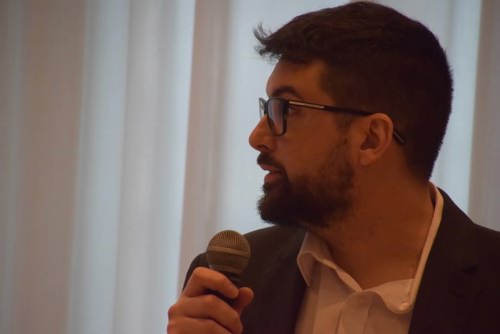
On Saturday, 29th March, I was in Vicenza, in the Northeast of Italy, not far from Venice. In 2010, the Classici Contro project began in this city, and it has since evolved into a national reality with branches throughout the country. It fosters a radical, critical engagement with the Classics, encompassing both literature and history, aimed at high school students and the general public to challenge traditional, outdated preconceptions about the ancient world. This edition was dedicated to the theme of Demos, and I was invited to give a paper titled “Protests and Riots between Ancient Rome and Today” in the afternoon section, on “People Power,” at the wonderful Gallerie d’Italia. I told some stories that my second-year Historiography students already know, like that of the First Secession in Livy’s second book, and some others that will be part of my Riots and Protest module in the future, like the graffiti on the temple of Concordia after the repression of the Gracchan revolt, or the demonstration in support to the Lex Gabinia voted in 67 BCE to give Pompey an exceptional command against the pirates. I argued that we need an approach “From Below”, as much as we need to study the political and military history, and we have to include in it marginalised voices (such as the lower classes, women, the enslaved). Protest and riots are traces of the voice of the ancient common people, the poor, the oppressed, and the excluded.
In the evening, I attended a session about “Resistance” at the Teatro Olimpico, a wonderful theatre designed in the late 16th century by Andrea Palladio, which preserves the original stage set from the first performance ever held in the theatre: a production of Sophocles’ Oedipus Rex, from 1585. It is breathtaking: the scenery gives the impression of the streets of Thebes, with a scenae frons in wood and stucco that imitates a Roman marble theatre. There, we listened to papers by the ancient historian Mirko Canevaro about class struggle in classical Athens, by the philosopher Giorgio Casarale about Marx’s response to censorship in Prussia, and by the Italianist Luciano Zampese about Luigi Meneghello, an author who wrote novels about the Italian Resistance against Fascism. Alongside the academic offerings, students from two Liceo Classico (schools specialising in the Classical culture) performed Aristophanes' Ekklesiazousai and an original piece titled “Canto di Terra e Mare” (“Song of Land and Sea”). Watching the students give their whole heart to these performances in that superb context was a very emotional experience.
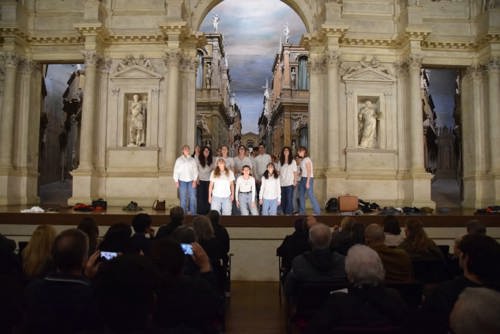
These two days in Italy gave me incredible energy and enthusiasm, particularly thanks to the exchanges with audiences that were not composed of scholars but of ordinary people eager to listen to stories about the ancient world.’
Spring 2025
Classical Studies and … Healthcare Technology
Ashlie Leal
Earlier in the term, our Head of Department, Prof. Christos Kremmydas, had an opportunity to re-connect with one of the class of 2016 Classics Dept graduates, Ashlie Leal. Following on from that, he asked her to send us a brief update of what she has been up to since graduating nearly a decade ago! It is fascinating (and inspiring) to see the range of careers that our alumnae and alumni have pursued. Ashlie is already making a difference in the world!

“My name is Ashlie Leal. I studied Classical Studies between 2012 and 2016. Since leaving Royal Holloway, I have pursued a career in healthcare technology. I have been fortunate enough to work at the cutting edge of Spatial Computing, specialising in applying Virtual Reality (VR) technology for Surgical Education around the world. One of the highlights of my career to date has been contributing to the creation of a VR simulation program for the first ever FDA approved gene therapy - for which I even got to observe the procedure in the operating room, an experience I will never forget.
When I enrolled at Royal Holloway for a Classical Studies degree in 2012 I had no idea of the job opportunities that would await me after completing my degree, indeed a career in the healthcare technology sector was not something that had even crossed my mind. My education at Royal Holloway instilled in me a thirst for knowledge and taught me to be analytical, resourceful and curious, skills that have aided me enormously in my career to date. I am now a Vice President of my company and continue to work in the healthcare technology sector primarily in the USA, where I focus on creating training and education technology for innovative medical devices and pharmaceuticals - from surgical robotics to stem cell therapies.”
Egham to China and Back: building cross-cultural conversations on ancient Rhetoric
Prof. Lene Rubinstein
A few months ago, Prof. Lene Rubinstein had the opportunity to give lectures at prestigious conferences in China. She writes about her experience and the way in which Classics may help encourage constructive dialogue between different cultures.
“In 2023, the Classics Department had the privilege of welcoming Dr Mengzhen Yue, who joined us as a British Academy Visiting Fellow. Her project focusses on the reception and translation of Aristotle's Rhetoric in 20th century China, adding a new and important global dimension to the research environment of the department and to the activities and reach of our Centre for Oratory and Rhetoric. It has also provided an opportunity for the department to forge connections with the large, and growing, community of Classicists in China.
In July 2024, I had the privilege of attending the Tenth Nishan Forum on World Civilizations in Qufu, contributing a keynote speech on Aristotle's Rhetoric as part of our global heritage and on its continued relevance in our present turbulent world. This is a world in which we – as individuals, as communities and as nations – depend more than ever on effective communication as a way of fostering mutual understanding across cultural and linguistic boundaries. Over the past two millennia, the translations and adaptations of Aristotle's Rhetoric in the Near East, North Africa and East Asia have demonstrated its enduring relevance and potential on a global scale.

Since August 2024, the department's engagement with the Chinese community of classicists has been strengthened further. Dr Yue has taken up a two-year UK Research and Innovation/Marie Skolodowska-Curie Actions Fellowship, with a project entitled Constructing the 'Barbarian Other' in Attic Oratory of the Fourth Century B.C.E., and with the further objective of forging and promoting connections between classicists in China and in the West.
In November 2024, I was invited by the University of Shandong to represent us at the Classics World Congress in Beijing, which was an overwhelming, positive experience. This summer Dr Yue launches a series of on-line seminars on the Greek rhetorical tradition under the auspices of our Centre for Oratory and Rhetoric and of the International Society for the History of Rhetoric. It is our hope that these contributions to the dialogue between Chinese and Western scholars in the fields of Classics and Rhetoric may eventually contribute to the shaping of positive and constructive dialogues between our civilisations.”
Greek, Latin and Coffee
Dr Dimitra Kokkini & Dr Lucrezia Sperindio
"Starting out a new job, always comes with new challenges: getting adjusted to a new timetable, to a different university and department, getting all the teaching materials in order before class, etc.... As the new Language Tutors at Royal Holloway we were excited to realise how much prominence and support language acquisition has in the Department of Classics, and how invested the students are, even when faced with, for instance, the daunting squiggles of the Greek, or the sequence of tenses in Latin.
At the beginning of the academic year, being both new to the role of Language Tutor in the department, we had to find our own footing with it. As a Greek and an Italian, respectively, we come from similar linguistic backgrounds and from countries with a very traditional understanding of language teaching and acquisition, and it has been refreshing to experience the enthusiasm of students who actively choose to pursue an ancient language and are clearly keen to explore the ancient world, in all its fields from archaeology to philology. We found ourselves very eager to provide them with the tools to start their own journey, which, we hope, will be as intriguing as it has been for us, back in our dinosaurs-days.
Sharing an office and collaborating closely has been another bonus, as this has allowed us to prepare classes together, reflect on pedagogical issues, and find new ways to make some grammar topics, if not pleasant, at least more palatable for our students. Not to mention the necessary, but welcome, stream of coffee and chocolate that all our hard work comes with – one of perks of this job!
A second perk is that of adapting our own favourite texts, from Latin poetry and Greek drama (our respective fields of interest), for translation practice. Students are always very receptive and curious about what we actually like to read in these ancient languages.
Engaging with a multicultural student body, we both found extremely rewarding to experience the ‘light-bulb’ moment of understanding what a subjunctive is and does across Greek, Latin – and English. For grammar nerds like us, talking all day about morphology and syntax is a dream come true. But the real treat (and thrill!) is in the classroom, witnessing our students’ progressive milestones: from a basic understanding of ancient grammar terminology to communicating in jargon and eventually reading competently ancient texts, in the course of just a term."

Discovering the Joy of Creative Writing Assessments
Ashleigh Vimalenthiran, 3rd year Classical Studies
"One morning while I was getting a quick coffee at the Boilerhouse before my 10 am lecture, I happened to bump into (not literally) Dr. Efi Spentzou. We were having a brief catch up while waiting for our drinks since the last time we had properly spoken was last year when I was taking her modules! We were talking about how I had been getting along this year, what modules I was doing, the assignments I had, and so forth. The highlight of the conversation was definitely about the creative assignments I’ve done over the past two years.
It all started with an assignment for Efi’s “Power and the Individual I Ovid’s Metamorphoses” which I took in my second year where the task was to give a character from the epic a louder voice. I chose to write about Galatea, Pygmalion’s statue turned wife (which, yes, is as bad as it sounds), intrigued by the fact that, throughout Ovid’s version of the myth, she is not once given an opportunity to speak. This creative writing task opened my eyes to many different views on not just the myth I chose to re-write, but also on Ovid’s Metamorphoses as a whole. On top of that, this assignment was also one of the moments where I truly came to realise how much I love studying literature and also writing it myself.
Another assignment that had my brain buzzing with ideas was in Dr. Richard Hawley’s module, “Of Masks and Voices: Gender and Performance in Ancient Greece”. For this assignment, we were expected to write a creative reconstruction as if it were written by a woman living in 5th Century BCE Athens. There were certainly both pros and cons to this; while I greatly enjoyed building my own character and laying out a story for them, the research behind this was especially taxing and there was only a certain amount of creative freedom that could be exercised, to keep in line with what an Athenian woman could do. It would surprise you how difficult it was to even simply pick a name for my character and then support it with some form of evidence proving that it was used for women in ancient Athens!
However, having said this, I must admit I find myself looking forward to my next creative writing task which involves writing a poem based on the Ancient Greek lyric poet Semonides’ ‘Types of Women’ poem, but making the subject of the poem to be men. I am quite curious as to how that will play out...
Overall, I’ve really enjoyed these creative writing assignments so far as they have given me the choice to cast my own perspective on the texts and topics we have studied. At the same time, they’ve provided an altogether new experience of coursework; a refreshing break from the typical essay questions! So, if you haven’t already tried a creative writing task, whether for coursework, or even for fun, I’d definitely recommend it!"

Womanhood and Religion in Classical Athens: A Lived Reconstruction
Isobel Chase, 3rd year Classical Studies
"As my first assignment for my “Of Masks and Voices: Gender and Performance in Ancient Greece” class this year, I wrote a creative reconstruction, imagining the life of a girl from birth to death, living in 5th c. BCE Athens. As I wrote this piece, I got to know Korina intimately, from her feverish childhood in which she danced the line between the living and the land of Persephone (her namesake), to her involvement in the Panathenaia, to her first baby, and the loss of her second. This girl, although my own creation, has existed many times throughout Athenian history, and women still share her experiences today. She is an archetype of womanhood, aspects of which will be encompassed in the lives of all, whether ancient or contemporary.
When my close friend and fellow classicist suggested to me, then, that we apply for the Normanby Fund, a grant provided by the Dilettanti Society, for Classics undergraduates to travel to ancient sites, I felt sure that our focus should follow in the footsteps of this assignment that resonated with me so deeply. And so we chose the title “Womanhood and Religion in Classical Athens: A Lived Reconstruction”. Our idea is to dedicate a day to each period of a 5th century Athenian woman's life, inspired by how I split my creative reconstruction into four sections; four days of the trip will then cover the life of an Athenian woman, focussing on her religious involvement, with the fifth day exploring links to her later life in Athenian art, cultural heritage, and life.
On day one, we will explore infancy and childhood, sourcing artefacts such as ceramic children’s toys dedicated to Artemis by young girls before their marriages, and visiting Brauron to explore the festival of the goddess Artemis, focusing specifically on the Arkteia, a ritual in which young girls aged 10-14, “played the bear”, as a rite of passage into adulthood. On day two, we will walk the Panathenaic way, from the Kerameikos, to the Agora, to the Acropolis, in tribute to the teenage girls that would have taken part in the weaving of the peplos for the goddess Athene as part of the ergastinai, and then performed as kanephoroi, carrying baskets of figs in the Panathenaic procession. Day three will take us to Elefsis, where we will visit the site of the Eleusinian Mystery Cult, dedicated to Demeter and Persephone which welcomed (Greek- speaking) men, women, and slaves (as long as they had not been convicted of homicide). This inclusive yet elusive cult would have been a significant part of the lives of many 5th century Athenian women, as a cult that not only welcomes women but celebrates them, and acknowledges the unique relationship between mother and daughter. Day four shall be spent in the Kerameikos, taking a close look at death and burial and funeral rites, and we will be able to get a keen sense of how the lives of these ancient women ended; how they were honoured; and how much they were valued within the city they spent their lives in.
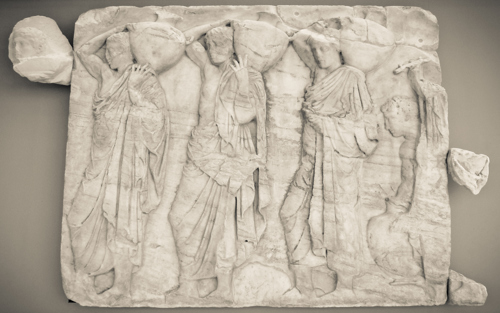
On day five, we will attempt to follow Athenian women forward through the ages, from antiquity to the present. We will visit the caryatids in the Acropolis Museum, the famous female priestesses (whose statues are) embroiled in a contemporary dispute about cultural heritage between Britain and Greece; an indication of how female bodies, whether flesh or stone, are politicised in the modern day. In the nearby National Gallery and Benaki Museum we will sample statues and paintings of Greek women of later centuries, seeking to find traces of the Classical woman whose lived experiences we spent a week reproducing. Through our tour of contemporary art in Athens, we are also keen to explore whether and when Classical women succumb to aestheticism in artistic tradition, and become a paradigm of something more ancient and unattainable, an artistic display of femininity of past times. Our last evening in Athens is set to be filled with exciting discussion and debate.
To have this opportunity to recreate some experiences of the life of a young woman from ancient Athens on this pilgrimage through time with a friend and woman with whom I have shared a lifelong bond through the Classics, would be as close to walking in Korina’s shoes as I could possibly hope to get – and I can’t wait!"
Hidden Gems? Archaeology in my New Office
Dr Joshua Thomas
"Starting a new job always conjures up a real range of emotions. One of the most exciting parts, in my experience, is opening the door into a new office for the very first time. After all, this the place where I will be spending a good chunk of my working life over the coming years: preparing lectures, meeting with students, and plotting my next big research project. I am happy to report that my new office at Royal Holloway is bright, spacious, warm, and quiet — precisely what I had been hoping for.
The office’s previous incumbents have been extremely generous in leaving me a fantastically rich collection of books and journals to use for teaching and research. This means that I only need to swivel around in my chair if I want to read about Roman mythological sarcophagi, Etruscan visual culture or elaborate fashion hairstyles in the Roman world, among many other exciting things.
Still, the items that most grabbed my attention were actually not books or journals at all. I was most drawn to a pair of varnished wooden boxes sitting on the bookshelves, which have obviously been knocking around the department for quite some time. The boxes themselves are nice to look at, but it was the objects inside that really piqued my interest.
Opening the boxes, I was confronted with several hundred plaster impressions of engraved gems, many of them beautifully decorated with scenes taken from ‘classical’ mythology — like this example showing Hephaistos wielding his hammer and towering over a snake-legged giant.
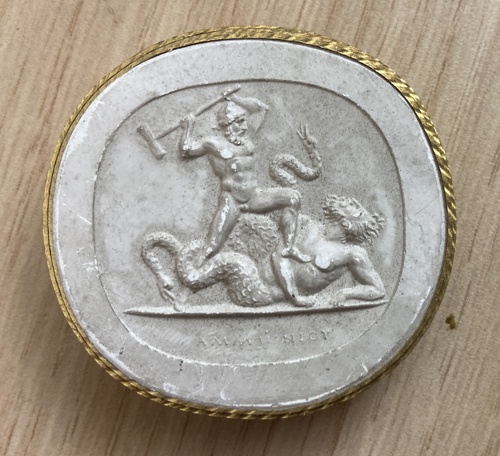
We know that engraved gems were important personal items during Graeco-Roman antiquity, being made from expensive semi-precious stones sourced from across the known world. The gems usually had depictions cut into the stone, which could then be countersunk to produce a relief image when used as seal in clay, plaster or wax. What we have in the department, then, is a modern collection of gem impressions created by sinking the original engraved stones into plaster.
For somebody very interested in ancient art, many of the figures and subjects represented on the gem impressions were immediately recognisable. At the same time, though, I could tell that many of the mythological scenes are very different from those that we tend to encounter in ancient Greek and Roman visual culture. Take, for example, the impression showing Zeus appearing from a blazing ball of fire during his abduction of the nymph Aegina, accompanied by his signature eagle.
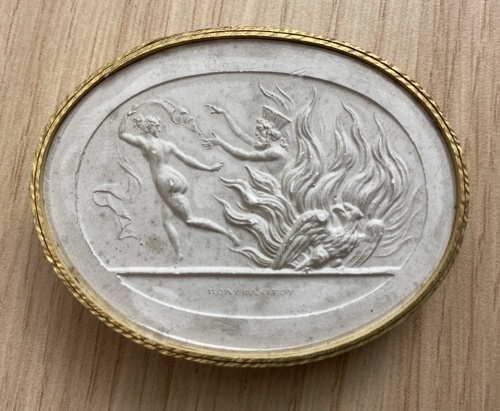
I know of very few ancient artworks that depict this sad story — and none that configure it in this ‘scorching’ way.
With an hour or two of detective work, I was able to crack the case. Our collection of impressions was produced not from ancient engraved gems, but rather from a modern gem collection commissioned by a Polish nobleman named Stanislas Poniatowski, who lived between 1754 and 1833. Poniatowski was an interesting character. He commissioned around 2,500 brand-new gems inspired by ancient texts, but was very keen to encourage the belief that they were in fact ancient. Interest in these gems waned after their modern origins were exposed in the 1830s, but more recently they have come to be appreciated by gem specialists as beautiful and important objects in their own right. How exactly so many impressions of these gems ended up at Royal Holloway is something I remain very curious about.
My investigation of the gem impressions has been just one part of a voyage of discovery since starting at the department in December, and I feel fortunate that colleagues and students have made me feel so welcome. Like the specialists now fascinated by the Poniatowski gems, I am very excited to embrace new things!"
Autumn 2024
On a path to PhD by creative practice
Tom Barrett, 2nd year PhD Classics
Year of research is coming to a close,
And my work is becoming both fecund
And exciting as my project just grows
In places I never expected it
To bloom. The more I write, the more I see
Academic and creative don’t fit
In one tight box or clear category,
That maybe the scholar and the artist
Are not so easily divided up,
That the two writing modes can coexist
Within the developing research cup
From which I drink. Sometimes academic
Analysis in prose is not the best
Way to express thoughts but an alchemic
Mixture of prose and drama that can wrest
The Classics from itself, give voice to those
Who fall into the gaps, silenced, ignored,
Creating a new and queer text that shows
Characters once hated can be adored,
And the invisible can be made seen,
In a new world of that which could have been.
Walking Around the Ancient Streets of Athens
Liana Revell, 3rd Classical Studies
“The Athens trip provided me with some really great experiences. From walking around the ancient streets, to being able to identify types of materials, their sources and traditional uses. It was much easier understanding and finally being able to piece together all of the information and geography of the city that I had been learning over the past three years of Archaeology modules. It was very beneficial being able to walk around with Jari and ask questions in a much more hands on approach to Archaeology lectures!
Not only did the Athens trip give me some great academic experience, but the city as a whole was beautiful and i definitely made some core memories. I was able to get to know more of my classmates better than I would in a classroom setting and what better place for twelve classicists to do so!
My favourite memory for the trip was definitely sitting with my friends atop the Pnyx at sunset. The view was amazing, but the Acropolis in the background lit up by the orange glow of the sunset is truly something i will remember for the rest of my life.”

Across the Atlantic
Alexis Bacon, 4th year, Classical Studies with an International Year
During my second year I came to learn about an opportunity to study abroad that was offered by the university; this means that once I graduate this year I will have a degree in Classical Studies with and International Year, combining my love for the Classics with my adoration of different cultures and experiences. Out of all the choices I could have taken, I chose to study abroad in the United States, specifically at Boston College, located just outside central Boston, in the quiet and classically American town of Chestnut Hill. Over the course of the year, I took a variety of classes, most of which were not related to the degree course that I study back at Royal Holloway, Classical Studies. In fact, most of the courses I studied while in the states were centred around Political Science and Economics. Studying these courses opened my eyes to the complexities of national economies and international politics.
In my first semester in Boston, I studied a module called International Finance, which turned out to be an advanced course; although I think it may have taken a couple years off my life, I found it tremendously interesting and eye-opening: seeing how complex economies work and understanding why certain things affect monetary and economic policy. In conjunction to this module, I also took another one called Aspects of Economic Growth. In my second semester, I decided to take more modules surrounding political science and economics; after my first semester where I discovered my passion for understanding how certain choices affect world economies, I wished to continue this study and delve deeper into the theories that try to explain our modern societies. So, I chose: Alliance Politics, Macroeconomics, Political Behaviour and Participation. These modules really kicked my love for the fields into overdrive, particularly political science.
Alliance Politics, another advanced course, studied how Alliances are formed and maintained, as well as the diverse types of alliances that exist; it used case studies and real-life examples to help craft a module which gave a comprehensive view of alliances and their importance to geopolitical relationships. Political Behaviour and Participation, as the name implies, was a course that concentrated on how people vote and why people vote a certain way with a substantial portion of it focusing on the psychology of people voting. This study culminated in me authoring an essay on economic inequality and its relation to the rise in populism.
The particular subjects I studied while in Boston really invigorated my love for Classics, and specifically the economic and political side of Classics, that I had never really thought about before. Now in my fourth and last year in the Classics department at Royal Holloway, I have elected modules centred around the very concepts I studied while abroad. As a result, I am enjoying my last undergraduate year a great deal and I am learning a lot, especially at the Social and Economic History of Rome, a very interactive, ‘hands-on’ module taught by Richard Alston. Furthermore, it was my engagement with international finance in my Year Abroad that fuelled my interest in writing my dissertation on Roman Trade in the East of the Empire.
Studying abroad for a year really opened my eyes to a whole raft of other courses and programs that I now know I have potential in; so I recently applied to King’s College London for a Masters in Government Studies, a course which is taught in conjunction with the British government and one which, I am happy to say, I was given an offer to join. Studying abroad really helped me shape and give direction to the future, my graduate plans as well as possible career choices. My advice to anyone thinking about studying abroad would be: go for it, it is not a decision you will regret in any shape or form.



Kill or Spare? Or, How to End a (mythic) War’: Student Intern leads Myth and Voice storytelling workshop
Dr Efi Spentzou
“Very many thanks are due to our Classics Society who provided a home to Kill or Spare? Or, How to End a War, a Myth and Voice workshop devised and delivered during the third week of term by Linnie Serstobojeva, third year Classical Studies student. As Myth and Voice student intern, Linnie has worked with patience and focus to draft materials, organise student groups for feedback, and finalise the activities.
The two-hour workshop was loosely based on the ancient myth of Trojan Aeneas and put the war in Italy (i.e. Book 7-12 of Virgil’s Roman epic, the Aeneid) at centre stage. Our participants in small groups undertook advocacy for a character of their choice. A deep curiosity for sidelined or voiceless figures emerged, as the small groups tried to get into the shoes of individuals and communities affected by the conflict. Our participants tried twice to stop the war: once just before its outbreak and once deliberating the ethics of killing an injured man, thus modelling possible different endings to the epic’s (in)famous last scene.
I was deeply impressed by their enduring commitment to reach a solution. There were passionate views in the room; extensive discussion as to who should get a place round the table of negotiations; deep concern about any voices in danger of being excluded. But, as the rounds of negotiations progressed and the delegates persisted in their search for peace, they were also drawn into a growing respect for each other’s fictional characters, a respect directly corresponding also to their visibly relaxing in one another’s presence and to their growing pleasure at being part of this immersive storytelling.
Thank you, Linnie, for such thoughtfully prepared workshop – and for this fulfilling experience!”
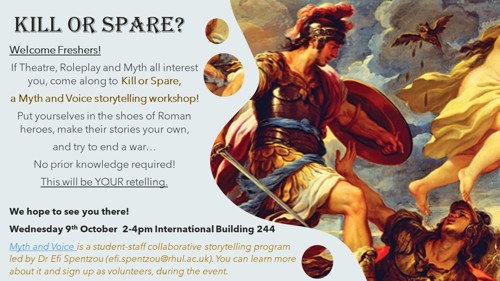
Searching for Home
Dr Susie Ashton
‘My first few weeks of teaching at Royal Holloway have circulated in various ways around the notion of ‘home’. On the darker and more disconcerting end, our second-year Greek drama class has been exploring the centrality of the oikos in Aeschylus’ Oresteia, thinking about how the Argive home of Agamemnon is both site and symptom of the various transgressions committed across the tragic trilogy. On a more cheerful note, though admittedly no less bloody (we’re talking about Greek myth, after all), our first-year Greek Literature students have had their sweeping introduction to Homer’s Odyssey. Amidst the epic’s celebration of nostos fulfilled and a family reunited, the poem speaks to the uncertainties of what home means after such a long time estranged from it.
I imagine for most of our students, particularly those embarking upon their first year, that question of ‘home’ is also sitting somewhere at the forefront of their minds. While the odd bout of homesickness is always inevitable, one of the most wonderful experiences of university is its ability to reshape what ‘home’ means to you: you come to discover that ‘home’ can be carried in small keepsakes or made anew through those friendships that nurture the deep and formerly quiet parts of yourself. The experience can be quite confronting when you first head off to university, yet embracing it can set you up for a lifetime of navigating the world with an unrivalled sense of curiosity.
Beyond the classroom, I’ve found my own mind roaming around the question of what ‘home’ now means to me. When I count back, it’s been just over ten years since I last truly ‘lived’ in the UK. While it hasn’t exactly been Odyssean (modern air travel would have been a significant balm for most of Odysseus’ woes), I can certainly recognise the uncertainty that is bound up in laying new roots in places that are both familiar and unfamiliar. Yet while ancient tragedy and epic don’t always offer the most reassuring depictions of homecoming, they do follow experience in teaching you that your sense of home always has space to grow. In this way, it has been an odd sort of comfort to retrace these ancient steps as I settle into my new academic ‘home’ at Royal Holloway. And if nothing else, while I struggle away with finding lecture rooms and an ongoing (losing) battle with technology, you can always rely on the Oresteia to really put your problems in perspective...’
An Old Song: Eurydice on the (musical) stage
Francesca Wolff, 3rd year Classical Studies
‘Over the last two years, I’ve had the opportunity to be involved with the Musical Theatre Society on several different musicals, and have really enjoyed the experience of putting on a show, especially looking at how staging, lighting, music, and other elements of a production can enhance and influence the story overall. When it came to choosing a topic for my dissertation, I am very excited to have been able to choose a topic (supervised by Efi Spentzou) that combines my love of classics and mythology with my passion for musical theatre, in exploring the reception of the myth of Orpheus and Eurydice in modern musicals and how musical theatre is well-suited as a medium through which to portray the myth.
In summer term last year, I played Eurydice in a performance of Wait For Me (Reprise) from Hadestown (directed by Deni Mistry, 2nd year Film and Digital Production student, and musical directed by Maddie Smith, 3rd year Music student) in MTS’ Summer Cabaret. The experience of putting myself in Eurydice’s shoes and exploring staging in order to best tell the story through the three-and-a-half minute song made me really interested in how theatre can be used to support stories. Standing stationary onstage and watching Orpheus (played by Jamie Hedge, 3rd year Drama student) stretch further away from me through the audience was so impactful and effective, and I am excited to explore different ways that the staging of musicals like Hadestown and Moulin Rouge lend a unique perspective to the story of Orpheus and Eurydice – a story that has been told so many times before, but all in such interesting and diverse ways.’
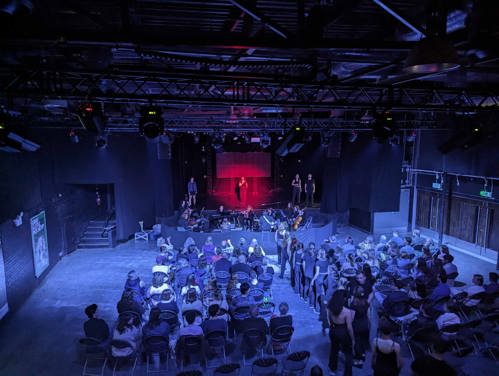
Week One (again)
Prof. Richard Alston
"Academic life has a reassuring seasonable rhythm. Some time at the end of July, the campus quietens leaving just a residual population of academics and postgrads. Across our leafy campus, there is a summer breath. In the further corners, one sometimes finds a grazing deer. Then, after what seems only a moment since the students were graduating in the hot summer days, it is late September: the buzz is back.
It is an audible change. The cars come down the hill in search of parking. Students call out to each other along the campus paths. The cafes are noisy. People greet each other in the corridors. Doors bangas people scurry along to ‘sort things out’. This year especially the transition seems to have been sudden. The rains have come. The winds are blowing. Autumn is here.
The students are back. It is the natural state of campus to be filled with people.
And so, we gather again. The year 2 and 3 students meet their personal tutors. We talk about how they have been through the summer. What are they looking forward to? We start the talks about life after the degree, almost always causing a brow to furrow as people think about what they need for the career ambitions. But mostly, it is chitter-chatter through which our relationships are renewed and catching up is caught up.
For the first-years, it is different. They are all lost to some degree. I have had first week of the year thirty plus times now. It is always a little daunting. But I remember how much more daunting it was when I first arrived at University. I knew nobody. I had no idea what I was doing or where I should go or how I should go there. I was a lost soul.
The key purpose of week one is to meet the lost souls and to reassure them that they are no more lost than anyone else and that one day soon they will be found. All the confusing details we talk them through will make sense. They are not alone and will be helped through the transition to university.
Somehow, it becomes so much better when I point that the person sitting next to them is equally lost, and why not just turn round and say hello to the person behind you? They might become a life-long friend; they might not. But they will be a familiar face in the next week, the next month and over the next three years. The best thing of all is in the first-year meetings, when I am about to talk through the Roman history for year 1, there is noise. Everyone had turned round and talked and made that contact. And then, I get them to quieten and think about what it is to study Roman history today.
In this generalised sense of not knowing, there is the start of a community and a journey. By the end of the week, timetables have appeared, as if by magic. There is schedule and order (mostly). From knowing no one, the community starts to form in the casual conversations and the cups of coffee and the gatherings in lectures and the discussions in seminars and even the waiting in corridors for the rooms to be available. Some things are, indeed, difficult: to be worthwhile, learning can never just be easy. But with those next to you and with your lecturers, you can work it. Those others are no longer strangers, but companions in the university journey, and slowly but surely, friends.
The world is so open for these brilliant wonderful, lively, engaged, vivacious people. Who will they become?
First week of the year: best week of the year."
Summer 2024
Why the Location of the Parthenon Marbles Matters: Reflections on Classics, Culture and Colonialism
Prof. Richard Alston
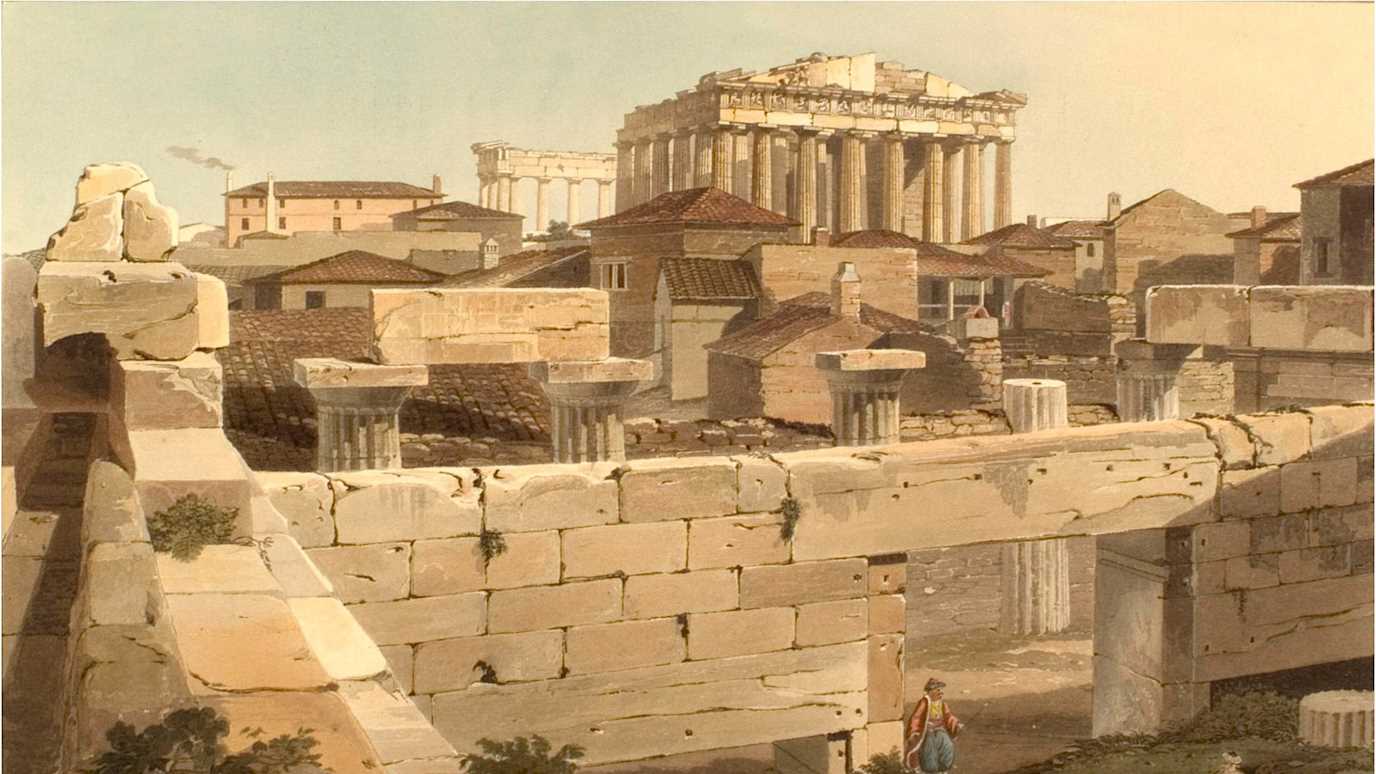
Cabinet ministers rarely comment on museum policies. Still rarer do Classical artefacts become front-line news in the cultural wars. But the Parthenon Marbles are an exception. The recent visit of the Greek Prime Minister, Kyriakos Mitsotakis, became a full-scale diplomatic spat when Mitsotakis restated, in answer to a direct question, the long-held Greek policy that the Marbles be returned to Athens. Rishi Sunak cancelled meetings, issued press releases, and despatched his culture warriors to go out and brief the press. My informants at the Greek embassy tell me that Mitsotakis, who learnt of his cancellation from X, was initially annoyed, then delighted. He was in London for a relatively low-key celebration of the life of Lord Byron, the Romantic poet and fighter for Greek freedom. But now his visit was headline news in Britain and Greece. The Prime Minister could be seen as standing up for Greek culture and heritage. The Parthenon Marbles were being debated and discussed and this coverage was the only way he could advance his country’s case. Whether this played well for Mr Sunak is not so obvious.
Royal Holloway Classics had already booked Professor Angelos Chaniotis of Princeton University to deliver the Dabis lecture, our annual summer public lecture. Angelos has a claim to be the most eminent living historian of the ancient Greek world. He advises a host of cultural institutions on their cultural policies including the New York Metropolitan Museum. There is no-one who is in a better position to provide an insight into the debates on the Marbles. I was honoured to respond to his lecture.
Angelos took us through the cultural and legal arguments. The marbles have been in the UK for 212 years and were on the Parthenon in Athens for nearly 2,300 years before being removed by Lord Elgin. In the UK, the marbles are often called ‘The Elgin Marbles’, which is bit like associating the Mona Lisa with Francis I of France rather than Leonardo da Vinci. Angelos demolished the legal arguments that Elgin had legal rights over the marbles. Those argument were regarded as spurious by many in the late eighteenth century. Even since the lecture, those legal arguments have been further questioned by the absence from the extensive Ottoman archives of any record of Elgin’s permission to remove the marbles. And, as a note, the Ottoman bureaucracy was extensive and their archives are extraordinary in their completeness: such a legal document should be there. Angelos showed how the separation and removal of the marbles is contrary to UN cultural heritage agreements, which establish ground rules for museums and the restoration of looted artefacts. He argued for a reconnection of the marbles, which are architectural features, with the Parthenon on art historical grounds and in restitution of a historical wrong.
My contribution was to situate the debate within the legacies of colonialism, not just Ottoman domination of Greece, but also of the subsequent Western European attitudes towards Greece. After the Greek War of Independence in the first half of 19th century, the Great Powers installed a Bavarian government. They justified this by arguing that the Greeks were unfit to rule themselves. One consequence was to see the Greeks not as heirs to their Classical legacy, and to claim that Greek Classics belonged to Europe. Thus, Classical Greek artefacts were better located in the great museums of the colonial powers. That argument has been maintained, even if moderated, over the subsequent centuries, and explains why little annoys my Greek friends more quickly than the UK’s political statements about the marbles: they are part of a long history of the (former) Great Powers diminishing the Greek state and Greeks themselves.
The argument on the Marbles is caught up in nationalism and colonial legacies. That poses a problem. It is almost an article of faith in our Royal Holloway community that:
Classics belongs to no one Classics belongs to everyone
This is central to our teaching and research. We would not endorse a Greek nationalist claim to the Marbles nor a British colonial claim. So where should the Marbles be?
It seems to me that there is only one answer to that: Athens. The reasons are historical, archaeological, and political. Taking the Marbles to London turned them into pure art. We are supposed to admire the workmanship and style. But the Marbles were so much more than pure beauty. They are/were a representation of the Athenian community. The Parthenon was the religious centre of Athens for millennia and the Marbles are part of that heritage. As Elgin transported them to the Piraeus, the inhabitants of Athens protested: part of their culture was being stolen. To understand the Marbles best, we need to see them in their urban, archaeological context and alongside the remains of the community that built and first valued them. In museological terms, they are far better displayed in the bright sun of Athens, in the spectacular Acropolis museum, than in a room in London. Why should an Athenian have to come to London to see the Marbles rather than a Londoner go to Athens?
There are other political reasons to return them: Britain struggles with the legacies of colonialism. It poisons elements of our cultural life and is weaponised by those who want to divide us. But our community was not divided by this debate. A university is a place where we need to discuss important issues, rationally and with passion. It is our function to talk through difficult issues and pose controversial questions.
In the discussion that followed the lecture, our community came to together to talk. We had about 150 people in the hall. Friends, members of the public, academic staff, post-graduate students and our undergraduates had their say. Many representatives of the Greek community came to join us, including staff from the Greek Embassy. One of the most eloquent contributions came from a first-year student, less than six months into their degree, happy to voice her opinion in front of such an audience.
The event was a brilliant example of what we do: we talk about important issues and we do that together and with respect. We value everyone from our first years to our professors. We take our debates into the community: no ivory tower for us.
The past is always with us. We can’t make a better future without it.
With many thanks to Angelos.
For a recording of the event see https://youtu.be/PQpwPaTUU_Q?si=dl1NtgnO2frg_1Gi
For more on Classics and modern issues, see https://www.royalholloway.ac.uk/research-and-teaching/departments-and-schools/classics/news/studying-the-classical-world-classical-views-on-modern-issues-11th-july/
On the Delights of Marking
Dr Liz Gloyn
“May is marking month in our department! Especially the last two weeks of it were particularly intense as I’ve had three modules-worth of work come in at once, so everything else had to be put to one side to work through it. You could tell this is the case from the state of my office at home, particularly my desk: with reference books and bits of paper strewn all over it, it was slowly but steadily sinking into quite an advanced state of chaos!
I’ve mainly been involved with teaching third year modules this year, which means that even though getting everything marked in time for the marking deadline has been intense, I’ve had the pleasure of looking at work produced by students at the peak of their academic careers with us. This has included students’ own adaptation of ancient myths for our Thinking Myth module, which always showcases amazing innovation and creativity in a wide range of different media, this year including videogame design and scriptwriting. I’ve also had the pleasure of marking our finalists’ dissertations, which are the capstone of a year working on a project of their choice. It’s one of the delights of this role that when a second year asks me ‘can I do my dissertation on this?’ that I’m usually able to say ‘of course’ and point them to the right person! I think it’s a real strength of how we operate that our students work on such a wide range of fascinating topics for their dissertations, and that we’re able to facilitate some real passion projects as a result. The proof really is in the pudding with these pieces of work – the amount of concentrated thought and reflection that’s been put into them really shows.”
The Futility of Revenge in Homer’s Odyssey: an art exhibition
Megan Griffin, 2nd year Classical Studies student
"During the last week of the Easter holidays, I put on an art exhibition in the library event space surrounding the theme of Revenge in Homer’s Odyssey, though it was only a short exhibition I felt so lucky to welcome over 160 visitors and share the Homeric tradition with so many people both within and outside of the university community. This exhibition was many of my visitors' first time hearing about Homer and I found myself retelling the legend of Odysseus many times over the three days that it ran, increasingly finding better ways to relate its subject matter to new audiences with each retelling. This was a task that was easier than I had expected as I increasingly realized that, despite its antiquity, the Odyssey and Iliad continued to entice audiences today with universal themes that transcend through time.
I also had the pleasure of welcoming many Classicists who were still on campus over the holidays and had many interesting conversations about the Odyssey and the possibilities presented by communicating ancient poetry through modern art. This was my first ever art exhibition and though it was extremely challenging (creatively, academically, emotionally, and organisationally) I also found the whole project profoundly rewarding. Through engaging creatively with the Homeric tradition, I feel I have developed a far greater appreciation of the epics and understand the artistry of Homer to a deeper level. Homer is not a static phenomenon but one that has emerged from years of composers engaging and developing a poetic tradition; it is by continuing to engage in new and creative ways with this tradition that we keep it alive.
I am so grateful to the department of Classics and especially Nick Lowe for allowing me the opportunity to put on an event like this and for supporting me through it. I’d also like to thank everyone who came and were so positive about my artworks; hopefully I will be welcoming many of you back to a bigger, better exhibition next year."
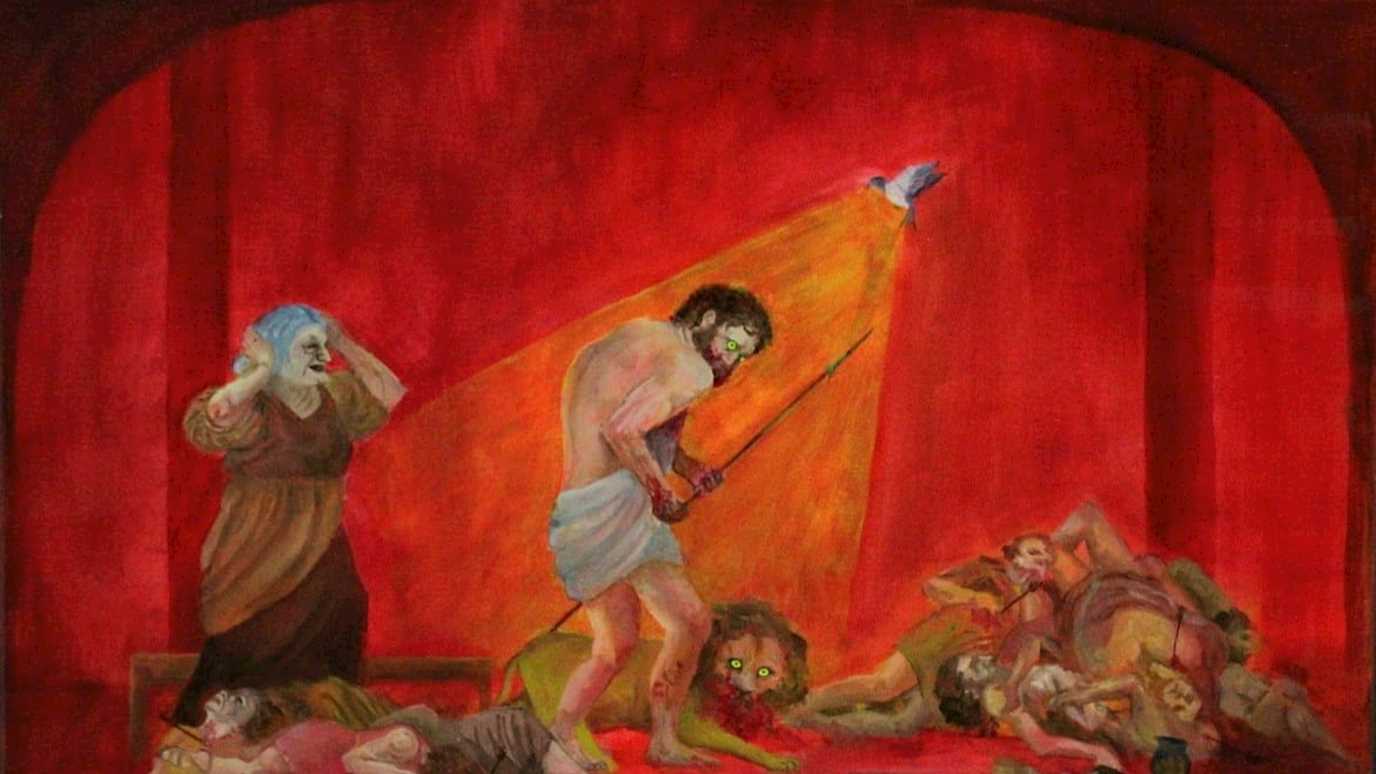
Mothers and Daughters: a creative writing workshop with Demeter and Persephone
Jojo Hills, Masters by Research in Classical Reception
"I was extremely fortunate to run a workshop at Regent’s University this week as part of my internship with Myth and Voice (http://mythandvoice.org/), led by Dr Efi Spentzou. I was working with a creative writing class, which featured a group of undergraduate students who came from a variety of backgrounds and academic courses, from Thailand to Hawaii to Denmark, from psychology to media and communications to international relations and more!
As well as for my internship, I had created this workshop with Efi as part of my master’s thesis, which examines the use of the myth of Demeter and Persephone from the 19th century to modern day, and how retellings of the myth throughout history reflect changes in the female experience. The group took the myth extremely well, they approached the workshop with enthusiasm and had some fantastic thoughts.
I was quite nervous ahead of the workshop, as it had been a while since I led a group of students in a classroom environment! But as this was an informal space for discussion and storytelling, and the group were very welcoming, my nerves quickly abated. I think it is fascinating to discuss mythology with non-classicists, as we so often spend so much time examining and analysing myths to such a degree that it is easy to get lost in them and forget what they are: stories that reflect the human experience. When a participant would say something about the myth that wasn’t ‘accurate’ (how can any one version of a myth be the true version anyway?), I felt myself go to correct them, before realising that we shouldn’t gatekeep these stories, as they provide opportunities for everyone to relate to and use in different ways. So, it doesn’t matter if someone doesn’t understand a myth in the same way as I do, the important thing is that they get something from the myth in the first place.
I was extremely honoured to be a part of this group for the workshop, especially as we discussed the topic of mother/daughter relationships, a key theme in the myth, which can sometimes be a difficult subject. At the end of the workshop, we all participated in a bit of freewriting, where I offered four general prompts and the participants could write about any of them (or all of them, as some did!) in whatever format they desired – or they didn’t have to write at all. I was blown away by the vulnerability and honesty shown by the group in their discussions of what it is like to be a daughter or a mother, and how this myth had stimulated their own thoughts and feelings on the topic of this relationship. This opportunity has given me so much to consider for my thesis, and I am sure that the longer I sit with this experience the more it will give me in not only my research and writing, but also in myself and how I approach this myth. I look forward to more Myth and Voice events in the future."
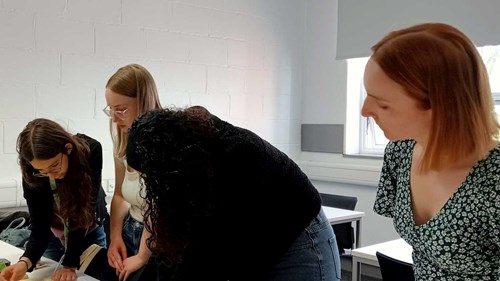
Jojo (right) observing a group activity during the workshop.
Archives
Spring 2024
Archived Spring 2024 entries from our ongoing blog series, ‘Scenes from the Life of the Department’, can be viewed here: https://cms.royalholloway.ac.uk/research-and-teaching/departments-and-schools/classics/news/scenes-from-the-life-of-the-department-winterspring-2024/
- Week 1: Student internships with the Classics department’s Myth and Voice: storytelling for community making project - Dr Efi Spentzou
- Week 2: Classicists at the “Meet the Grads” Night 2024” - Linnie Serstobojeva and Oscar Standidge, 2nd year students
- Week 3: Farming for Families: Having fun with Economic History (Really!) - Prof. Richard Alston
- Week 4: My final year dissertation and the National Gallery in London - Ella Bradbury, 3rd year student
- Week 5: Cold, wet and windy with Magnitude Surveys - Ellis Cuffe, 2nd year PhD Classics
- Week 6: Reflections on being a student ambassador - Lily Gregory, 2nd year student
- Week 7: Trying to change Classics for the better, one Zoom meeting at a time - Kevin Xu, 3rd year Classical Studies student
- Week 8: Memory, Conquest and Community in the Western Provinces of the Roman Empire - Harry Triggs, 3rd year Classics PhD
- Week 9: A helpless god: retelling Virgil’s Aeneid for a creative writing 2nd year project - Holly Workman, 2nd year Classical Studies
Autumn 2023
Archived Autumn 2023 entries from our ongoing blog series, ‘Scenes from the Life of the Department’, can be viewed here: https://royalholloway.ac.uk/research-and-teaching/departments-and-schools/classics/news/scenes-from-the-life-of-the-department-autumn-2023/
- Week 1: Thinking Globally - Prof. Richard Alston
- Week 2: Pandora’s Box and The Classics Hour on Insanity Radio station - Mia Ince, Masters by Research in Rhetoric
- Week 3: Cicero on … writing to your tutors - Dr Liz Gloyn
- Week 4: Classics and Dance - Beth Thomson, 4th year student
- Week 5: Our student representative in Seoul, South Korea - Emily Howe, 2nd year PhD student
- Week 6: “City of Athens” trip to Athens: a report and… a video - Madeleine, Emily, Tom, Dominik, James and Gethin, 3rd years
- Week 7: The Vesuvius Project: computer science unlocking the secrets of ancient scrolls - Dr Liz Gloyn
- Week 8: “Dig to Digital” in a teaching lab - Dr Erica Rowan
- Week 9: Summer filming project - Eleanor Atterton (MA Public History) and Maisie-May Gilchrist (MA Classics)
- Week 10: The Classics Society Symposium on “Medicine and Disability in the Ancient World”
- Week 11: A recent Classics Alumna on the National Graduate Development Program - Zoe Norman (BA Classical Studies 2021)
- Week 12: A homemade classical reception project - Chris Richmond, 1st year student





















